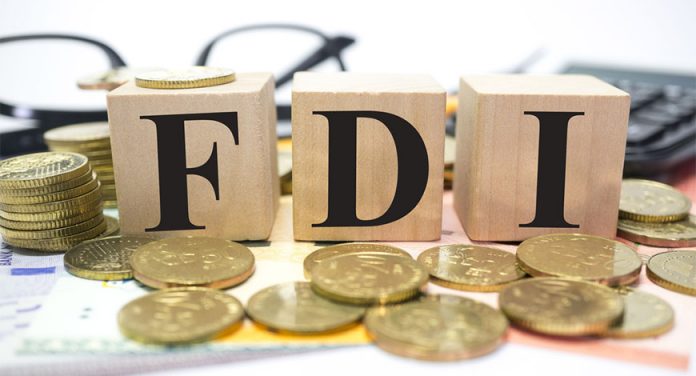This article is written by Mohini Sonkar pursuing Diploma in Business Laws for In-House Counsels from LawSikho. The article has been edited by Prashant Baviskar (Associate, LawSikho) and Ruchika Mohapatra (Associate, LawSikho).
Table of Contents
Introduction
Foreign direct investment (FDI) occurs when a person or corporation owns at least 10% of a foreign company. The International Monetary Fund (IMF) describes it as part of a stock portfolio when investors hold less than 10%. While a 10% stake in a corporation does not provide an individual investor authority over the company’s business, operations, or general policies, it does offer the investor influence over the company’s management, operations, and general guidelines.
Foreign direct investment is essential for emerging and developing market nations. Companies in emerging nations require global financing and experience in order to expand, organise, and direct their worldwide sales. These international firms require private investments in infrastructure. Through this article, the author seeks to discuss the advantages and disadvantages of the Foreign Direct Investment regime in the UAE.
Foreign direct investment in UAE
In terms of its capacity to attract foreign direct investment, the UAE was rated 27th internationally in 2018 (up three spots from 2017) (FDI). In 2018, the value of FDI inflows increased to around USD 10.385 billion, up from USD 10.354 billion in 2017.
In 2018, the UAE ranked first in the Arab world, accounting for 36% of overall FDI inflows to Arab countries. It placed second in the West Asia area, accounting for 35.5 per cent of overall FDI inflows to the region, and accounting for about 22 per cent of total yearly FDI inflows to the Middle East and North Africa region. Switzerland, the United Kingdom, India, the United States of America, France, Austria, Japan, the Kingdom of Saudi Arabia, Kuwait, and the Netherlands are the top investors in the UAE.
The United Arab Emirates (UAE) did not have a separate legislative system in place to govern the operations and monitoring of foreign direct investment (FDI) in the nation. As a consequence of the recently adopted Foreign Direct Investment Law, the UAE is currently in the process of establishing an FDI regime. This is supplemented and coordinated by strategies conducted inside the individual emirates. Through numerous measures, the UAE supports the greater engagement of international investors in the economy. The establishment of nearly 40 specifically designated free trade zones is a significant attempt to encourage FDI (free zones). These free zones, which can create separate regulatory frameworks within their defined jurisdiction, are appealing to international investors because of their clear business regulations, incorporating of wholly foreign-owned entities, and assured tax holidays on all corporate taxes. The UAE imposes no foreign exchange control rules, either inside or outside of free zones.
Despite various initiatives to attract international investment, the UAE maintains tight foreign investment prohibitions in essential industries such as defence and oil & gas. Furthermore, some economic activities continue to be restricted to UAE nationals and firms entirely controlled by UAE nationals. The country is not a signatory to the World Trade Organization’s Plurilateral Agreement on Government Procurement. As a result, if feasible, government contracts are allocated to local businesses and suppliers. Furthermore, outside of the free zones and to the degree authorised by the recently enacted Foreign Direct Investment Law, for any firms to be incorporated in the UAE, there must be a majority UAE ownership.
The Foreign Direct Investment Law, which came into effect on September 23, 2018, allowed the option of majority foreign ownership in UAE firms. According to the Foreign Direct Investment Law, a Foreign Direct Investment Committee (the Foreign Direct Investment Committee) should be constituted by Cabinet resolution and presided over by the Minister of Economy (Minister). The Foreign Direct Investment Committee should have the power to research and provide suggestions to the UAE Cabinet, after consulting with local governments, on the following issues:
- Establishing a list of economic activities that may be carried out in the UAE by a firm entirely controlled by foreign investors (the Positive List). In the Positive list, the resolution mentions 122 economic activities. These operations are permissible with 100% foreign ownership. There are three categories on the positive list where an investor can start a business. They are as follows:
- Agriculture industry,
- Manufacturing industry,
- The sector of services.
- Authorising foreign investment projects to carry out activities that are not on the Positive List based on recommendations from the relevant licencing government agencies; and
- Depending on the incentives offered to foreign direct investment projects in the UAE.
- They establish a list of economic areas in which foreign direct investment is prohibited (the Negative List). The Ministry of Economy (Ministry) maintains the authority to make changes to the Negative List as it sees fit. These industries are as follows:
- Exploration and production of oil
- Military (including the production of military weaponry, explosives, military gear, equipment, and apparel);
- Banking and finance operations;
- Insurance;
- Services for Hajj and Umrah;
- Various recruiting efforts;
- Water and power services;
- Fisheries-related services;
- Postal, telecommunications, and video services;
Foreign direct investment projects can take any of the following legal forms:
- A limited liability corporation, which includes a one-person (single-owner) business.
- A private joint stock business, including a single-person (single-owner) corporation.
Legal consequences of this new FDI law for companies
- Consider whether existing UAE on-shore companies should be converted to FDI companies, keeping in mind that any transformation from a limited liability company to an FDI company may open a door to further shareholder negotiations, especially if the conversion results in a buy-out of existing shareholders. Companies should conduct contract audits to examine the effect on key trading relationships and any change of control regulations that may be provoked in key business contracts as a result of any conversion; consider using company service providers for new investments – recognising that such corporate services are familiar with the basic regime and understand its requirements;
- Consider using corporate service providers for new investments, keeping in mind that such corporate service providers are aware of the current regime and understand the need of foreign investors to seek contractual safeguards through side agreements; and
- Consider including prospective regulations in shareholder agreements – we would usually expect to see regulations inside agreements requiring the local shareholder to convert its shares to the foreign shareholder in the event of changes in the law allowing the foreign shareholder to become the sole owner of the company. Based on the negotiating position of the parties, some agreements also include clauses that would allow the foreign shareholder to go through a pro-rata return of any services fees paid to the local shareholder if the arrangement were to be dissolved due to a change in legislation.
Advantages and disadvantages of the FDI regime
Advantages of FDI regime
Economic expansion
The most obvious benefit of FDI is the creation of employment, which is one of the primary reasons why a country (particularly a developing one) may seek to attract foreign direct investment. FDI stimulates the industrial and service sectors, resulting in job creation and a reduction in the country’s unemployment rate. Increased employment leads to greater wages and gives the people more purchasing power, strengthening a country’s total economy.
Growth of human capital
Human capital entailed a workforce’s knowledge and skills. Employees’ skills gained via training and experience can help to improve a country’s education and human capital.
Technology
Targeted nations and companies have access to the most recent finance instruments, technology, and operating practices from around the world. The introduction of newer and improved technology results in corporate dispersion into the local economy, resulting in increased industry efficiency and effectiveness.
Increase in exports
Many FDI-produced items have worldwide markets in addition to home consumption. The establishment of 100 per cent export-oriented enterprises aids FDI investors in increasing exports from other nations.
Stability of exchange rates
The inflow of FDI into a nation translates into a constant flow of foreign exchange, assisting a country’s Central Bank in maintaining a healthy reserve of foreign cash, resulting in stable exchange rates.
Increased capital flow
Financial inflows are especially helpful for countries with limited internal resources, as well as those with limited possibilities to obtain cash in global capital markets.
Establishment of a competitive market
By allowing the entry of foreign firms into the domestic market, FDI contributes to the creation of a competitive environment and the dismantling of home monopolies. A robust competitive environment encourages companies to improve their processes and product offerings on a constant basis, promoting innovation. Additionally, consumers have access to a broader choice of reasonably priced items.
Climate change
The United Nations has also advocated for the use of FDI throughout the world to aid in the fight against climate change.
Disadvantages of FDI regime
Hindrance of domestic investment
FDI can sometimes stifle domestic investment. Because of FDI, local firms in countries begin to lose interest in investing in their native products.
The risk from political changes
The political movements of other nations might alter on a regular basis, which can be difficult for investors.
Negative exchange rates
Foreign direct investments can occasionally influence currency rates in favour of one country and against another.
Higher costs
When investors invest in other countries, they may discover that items are more expensive than when they are exported. More money is frequently spent on machinery and intellectual property than in salaries for local workers.
Economic non-viability
Given that foreign direct investments might be capital-intensive from the investor’s perspective, they can be highly hazardous or economically non-viable at times.
Expropriation
Expropriation can occur as a result of constant political changes. In this situation, the governments of those nations will have authority over the property and assets of investors.
Modern-day economic colonialism
Many third-world nations, or at least those with a legacy of colonization, are concerned that foreign investment would result in some type of modern economic colonialism, exposing host countries to foreign businesses’ exploitation.
Poor performance
Multinational corporations have been chastised for the terrible working conditions in overseas factories.
Conclusion
The UAE government is pushing the economy and taking international investment seriously. The FDI Law demonstrates this, and it is a significant step toward expanding diversity across industries and advancing the UAE’s aim to become a global leader in attracting foreign direct investment. Companies are encouraged to implement future-proofing measures in light of the new FDI Law in preparation for the changes ahead.
References
- https://www.pinsentmasons.com/out-law/guides/the-uaes-foreign-investment-regime
- https://www.tamimi.com/law-update-articles/uae-foreign-direct-investment-law-recent-developments
- https://www.bakermckenzie.com/en/insight/publications/2020/04/uae-fdi-law-update-positive-list
- https://u.ae/en/information-and-services/finance-and-investment/foreign-direct-investment
- https://researchfdi.com/foreign-direct-investment-advantages-disadvantages/
Students of Lawsikho courses regularly produce writing assignments and work on practical exercises as a part of their coursework and develop themselves in real-life practical skills.
LawSikho has created a telegram group for exchanging legal knowledge, referrals, and various opportunities. You can click on this link and join:
https://t.me/joinchat/J_0YrBa4IBSHdpuTfQO_sA
Follow us on Instagram and subscribe to our YouTube channel for more amazing legal content.
 Serato DJ Crack 2025Serato DJ PRO Crack
Serato DJ Crack 2025Serato DJ PRO Crack











 Allow notifications
Allow notifications


